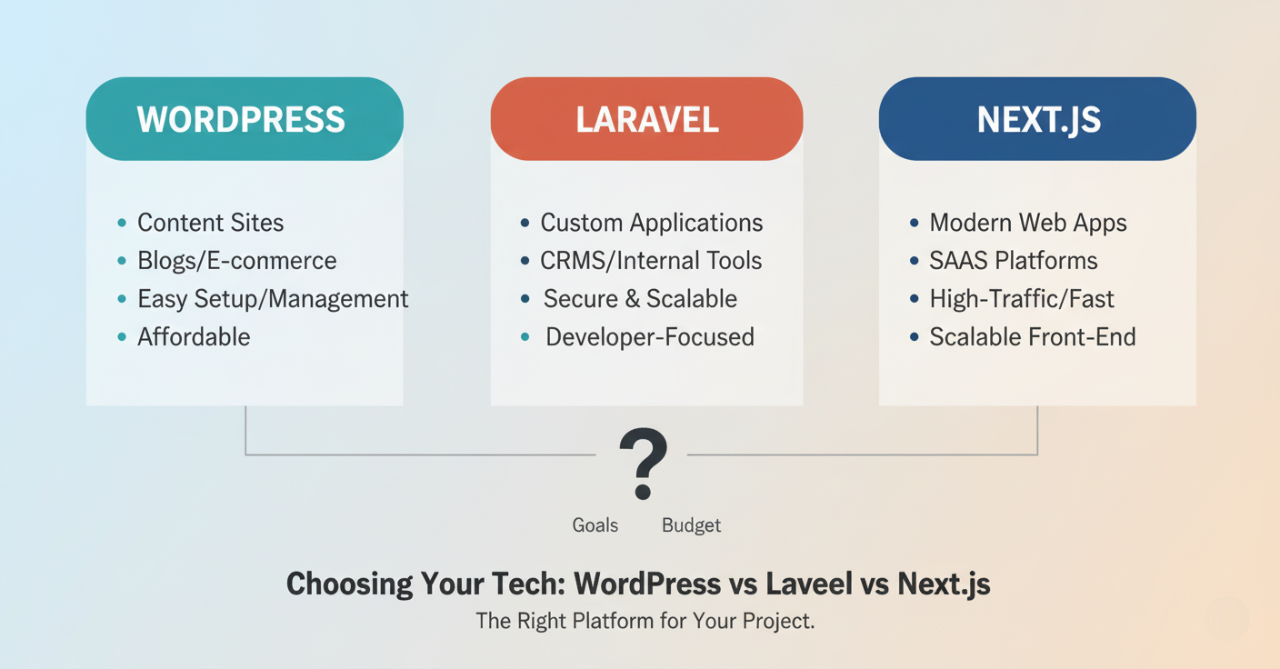How to Decide Between WordPress, Laravel, or Next.js for Your Project

Introduction
One of the biggest challenges businesses face when planning a new website or web app is choosing the right technology stack. With so many options available, it’s easy to get overwhelmed.
Three names you’ll often hear are WordPress, Laravel, and Next.js. Each is powerful in its own way, but the right choice depends on your project’s goals, budget, and growth plans.
Let’s break down when to use each and how to make the best decision for your business.
The Problem: One Size Does Not Fit All
Many businesses either:
- Pick the cheapest/quickest option (and regret it later), or
- Over-invest in complex tech they don’t actually need.
Both mistakes cost time, money, and missed opportunities.
Instead, the smart move is to choose a platform that fits your current needs and can scale as you grow.
The Approach: Understanding the 3 Options
Here’s a non-technical, client-friendly breakdown of WordPress, Laravel, and Next.js.
1. WordPress - Best for Content-Driven Websites
- What it is: A popular CMS (Content Management System).
- Best for: Blogs, company websites, small eCommerce, portfolio sites.
- Strengths:
- Fast setup with themes and plugins.
- Easy for non-technical teams to manage content.
- Affordable for small businesses.
- Fast setup with themes and plugins.
- Limitations:
- Heavy customization can become complex.
- Performance issues at scale if not optimized.
- Heavy customization can become complex.
Example: A bakery wanting to showcase products, update menus, and take online orders can launch quickly on WordPress.
2. Laravel - Best for Custom Business Applications
- What it is: A robust PHP framework for building custom web apps.
- Best for: Businesses with unique workflows, internal tools, CRMs, or complex portals.
- Strengths:
- Fully customizable to fit specific processes.
- Highly secure and scalable.
- Perfect for automation and integrations.
- Fully customizable to fit specific processes.
- Limitations:
- Requires experienced developers.
- Takes longer to build compared to CMS solutions.
- Requires experienced developers.
Example: A logistics company needing a custom dashboard for fleet tracking and reporting should go with Laravel instead of trying to bend WordPress.
3. Next.js - Best for Modern, Scalable Front-End Experiences
- What it is: A React-based framework for building high-performance web apps.
- Best for: Startups, SaaS products, high-traffic apps, or businesses wanting sleek, app-like websites.
- Strengths:
- Lightning-fast performance (great for SEO + user experience).
- Smooth for dynamic apps (real-time dashboards, social platforms).
- Modern developer ecosystem.
- Lightning-fast performance (great for SEO + user experience).
- Limitations:
- Less beginner-friendly for non-tech teams.
- Often needs a custom backend (Laravel, Node.js, etc.).
- Less beginner-friendly for non-tech teams.
Example: A SaaS company launching a customer dashboard with subscription management and analytics would benefit from Next.js.
The Solution: How to Decide Which One Fits You
Ask yourself these questions:
- What’s my goal?
- Content & visibility - WordPress.
- Custom workflows & automation - Laravel.
- High-performance apps & SaaS - Next.js.
- Content & visibility - WordPress.
- What’s my budget & timeline?
- Small budget, fast launch - WordPress.
- Medium to large investment, custom needs → Laravel or Next.js.
- Small budget, fast launch - WordPress.
- Who will manage it?
- Non-technical staff - WordPress (easy content management).
- Developer-led team - Laravel or Next.js (better long-term flexibility).
- Non-technical staff - WordPress (easy content management).
The Result: The Right Tech = Better ROI
Choosing the right platform doesn’t just save costs - it ensures your business can:
- Scale smoothly without rebuilding.
- Deliver a great experience to customers.
- Spend less time fighting with tools and more time growing.
Example: A startup I worked with initially thought of building on WordPress. After discussing their SaaS product needs, we shifted to Laravel + Next.js. This saved them future migration costs and helped them scale faster.
Final Thoughts
There’s no “best” technology overall - only the best for your specific project.
- WordPress is ideal for fast, content-driven sites.
- Laravel shines in custom business apps.
- Next.js powers modern, scalable web apps.
By aligning your choice with your goals, you ensure your project is future-proof, cost-effective, and growth-ready.
Call to Action
Not sure which platform is right for your project?
I help businesses evaluate their needs and build solutions using WordPress, Laravel, or Next.js - whichever fits best.
Let’s contact and find the perfect tech for your next project.
